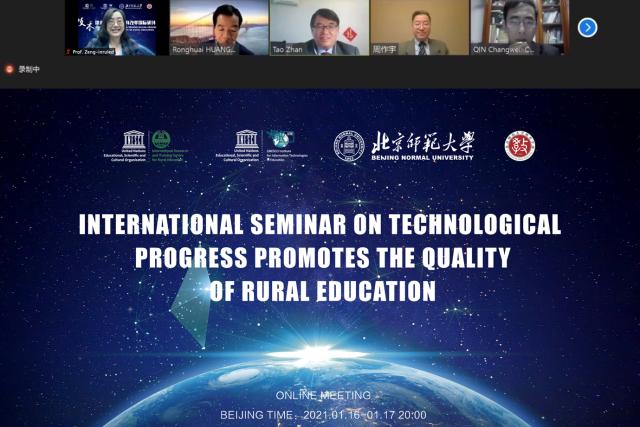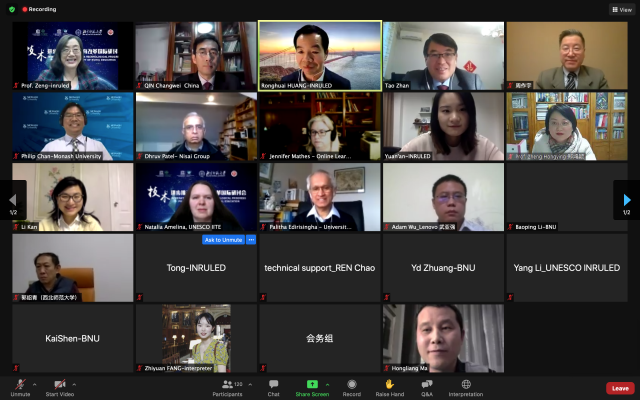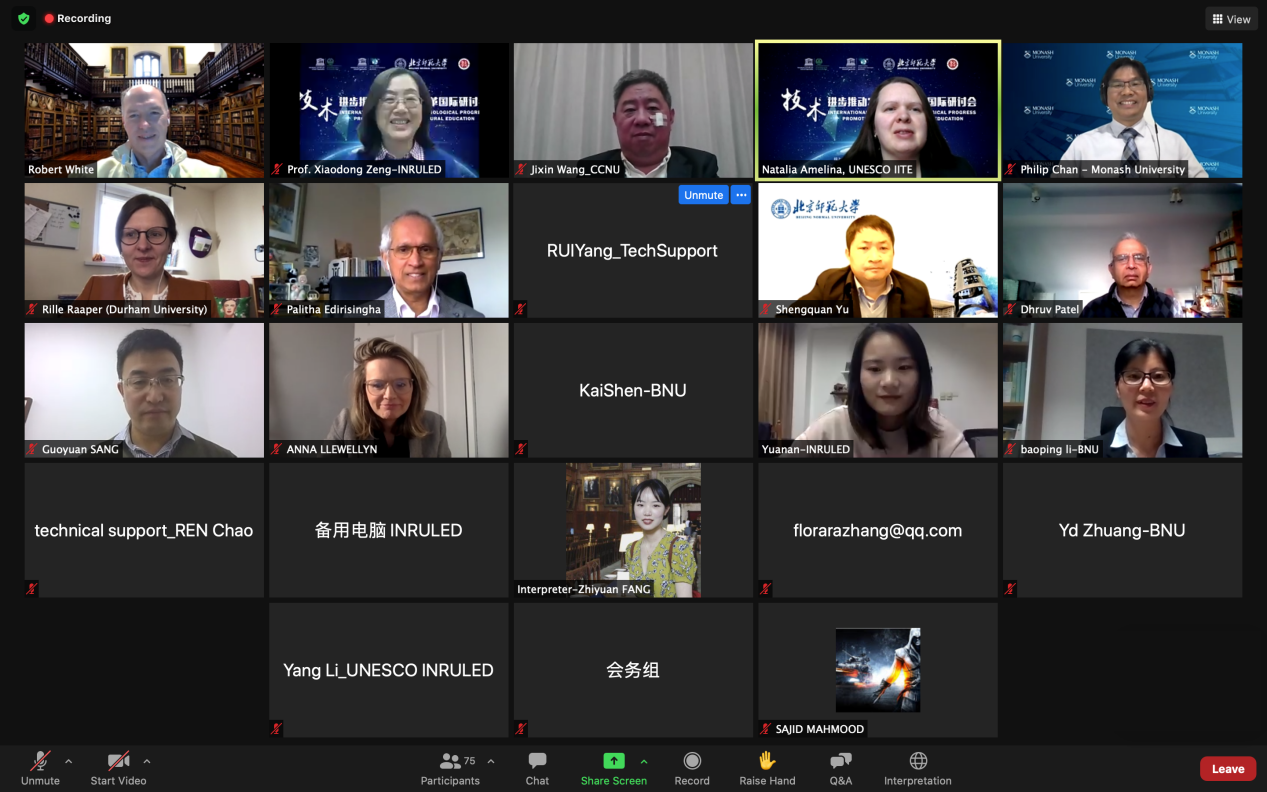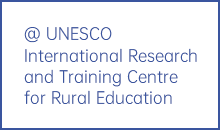The Covid-19 pandemic has promoted the wide application of online education and significantly reshaped the ecology of rural education. Under this context, On January 16-17, 2021, the UNESCO International Research and Training Centre for Rural Education (UNESCO INRULED), UNESCO Institute for Information Technologies in Education (UNESCO IITE), and Faculty of Education, Beijing Normal University, jointly held the international seminar themed “technological progress promotes the quality of rural education”. The seminar aims to bring together international expertise and resources to explore innovative approach of improving the quality of rural education through ICT in education, better cope with the educational challenges in rural areas under the pandemic, and to expedite the progress towards an inclusive and sustainable learning society.
The seminar was held online, bringing together experts and scholars from the United Kingdom, the United States, Russia, Belgium, Australia, New Zealand and other parts of the world, as well as experts and industry representatives from Chinese universities, research institutes, enterprises and media. The seminar lasted for two days, with four panel sessions held. The sub-themes for discussion are: technological progress promotes development theories of rural education, technological progress promotes pedagogical approaches of rural education, technological progress promotes partnership of rural education, technological progress promotes accessibility and inclusion of rural education, technological progress promotes leadership of rural education, technological progress promotes assessment of rural education. The seminar is live-streamed on Tencent Classroon and Xueshuzhi. The viewers of the seminar totaled nearly 3000 person time.
Professor Ronghuai Huang from Beijing Normal University, Director of UNESCO INRULED, presided over the opening ceremony. Professor Zuoyu Zhou, Vice President of Beijing Normal University, Dr. Tao Zhan, Director of the UNESCO IITE, Ms. Ping Li, Executive Director of the National Center for Educational Technology and Mr. Changwei Qin, Secretary General of the National Commission of the People’s Republic of China for UNESCO, delivered welcome speeches for the seminar.

Professor Zuoyu Zhou expressed his heartfelt congratulations on the opening of the seminar and extended a warm welcome to the attendees. He pointed out that the introduction of ICT in education into rural schools is not simply the replacement of the blackboard by the screen, but the revolutionary shifts in teaching methods, class organization, teacher engagement, learning methods, and evaluation. With this in mind, Beijing Normal University is looking forward to joining hands with global partners, including international organizations, universities, research institutions and private enterprises from across the world to explore innovative approaches to improve the quality of rural education through modern technology. Director Tao Zhan sent warm greetings from UNESCO IITE in Moscow, and emphasized that technology is a vital means to develop resilient education system in the pandemic era and that rural education is indispensable to ensure inclusive and quality education for all. Executive Director Ping Li pointed out that rural education is the key component, and also the choke point for ensuring balanced quality education in China. The application of technology can effectively bridge the resource gap and empower the rural teachers in their professional development. Secretary General Changwei Qin pointed out that technology is the key to the revitalization of rural education. However, during the pandemic, when large-scale online education is applied as the means for emergency response, existing problems are revealed and amplified, such as the household’s insufficient ownership of digital devices, teachers’ incapability of applying new technologies, and the sharp digital divide between urban and rural areas. Therefore, urgent action needs to be taken to ensure that children in rural areas can share a bright future with their peers in the cities. Following the addresses, a themed video of ICT in education is introduced to illustrate the key concept of the seminar and invite targeted discussion and exchanges. At the end of the opening ceremony, the experts took a group photo online.

The first panel session focused on two themes: technological progress promotes “development theories” and “pedagogical approaches”of rural education. The panel was chaired by Ms. Natalia Amelina, Senior National Project Officer in Education at UNESCO IITE. During the panel, Prof. Shaoqing Guo, Dean of the School of Educational Technology at Northwest Normal University, Dr. Jennifer Mathes, CEO of Online Learning Consortium, Dr. Hongliang Ma, professor of the School of Education at Shaanxi Normal University, Dr. Philip Wing Keung Chan from Monash University and Dr. Li Kan from Macquarie University in Australia, delivered wonderful presentations. Professor Shaoqing Guo’s presentation was titled “Promote the Balanced Development of Rural Basic Education with Shared Intellectual Resources”. Professor Guo introduced the practices of “special delivery class”, “double-teacher class” and “four-in-one” teaching mode of normal university volunteer-teachers of Northwest Normal University. It is hoped that the practices of delivering intellectual resources to rural areas with the application of digital technology could bring out innovative solution for ensuring quality rural education. Dr. Jennifer Mathes, CEO of the Online Learning Consortium, introduces the three types of interactions in distance education, and pointed out that the design of online learning environment should be more student-centered, initiative and collaborative, and that effective teaching design should be carried out. Dr. Hongliang Ma, professor at the School of Education at Shaanxi Normal University, gave a presentation titled “Rural Teachers’ Perception of Online Professional Development: A Community of Inquiry Perspective”, and argued that blended online professional development programme with the elements of discussion and interaction that responds to the actual needs of rural teachers has benefited the rural teachers. Dr. Philip Wing Keung Chan from Monash University and Dr. Li Kan from Macquarie University in Australia focused on pedagogical approach and teachers’ engagement in online English teaching, proposing that student-centered teaching mode through the effective use of body language and the creative use of digital technology should be adopted to improve the online teaching ability.
The second panel focused on the theme of “technological progress promotes partnership of rural education”. The forum was chaired by Professor Xiaodong Zeng from Beijing Normal University, Executive director of UNESCO INRULED. Professor Hongying Zheng, Director of International Cooperation Department at Sichuan Normal University, Dr. Dhruv Patel, CEO of Nisai Education Group, and Mr. Yaqiang Wu, Director and chief researcher of Smart Education Research and Development of Lenovo Research Center, gave keynote speeches respectively. Professor Hongying Zheng, Director of International Cooperation Department at Sichuan Normal University, presented with the topic "Exploration on the construction and implementation of Sichuan Normal University’s Rural Education Innovation Zones", introducing the practice and experiences of the University in developing the innovative cooperation zones. Dr. Dhruv Patel, CEO of Nisai Education Group pointed out that enterprises should provide innovative and quality online education that is community-led, community-owned and learner-oriented. Mr. Yaqiang Wu, director and chief researcher of Smart Education Research and Development of Lenovo Research Center stated that the realization of ICT-aided quality rural education requires all-rounded cooperation of government agencies, the civil society and the enterprises. High-quality teaching resources in urban areas should be “brought down” to the rural areas through technology, and the application of artificial intelligence in the teaching process should be used to improve the interactivity and teaching effectiveness of classroom teaching.

The third session on the 17th focused on the theme of technological progress promotes accessibility and inclusion of rural education and was chaired by Ms. Natalia Amelina, Senior National Project Officer in Education at UNESCO IITE. Dr. Jixin Wang, Professor at School of AI and Education, Central China Normal University, Dr. Palitha Edirisingha, Associate Professor at School of Education, University of Leicester, UK, and Dr. Robert M. White, Research Fellow, School of Education, Durham University gave presentations. Professor Jixin Wang presented with the topic "Three Classrooms +AI: Practice for Improving the Quality of Rural Education". He introduced two rounds of practices of his team in promoting the application of "Three Classrooms" in rural schools. The first round of practice helped open adequate courses. The second round empowered construction of "three classrooms" with AI and focused on providing high-quality lessons. Dr. Palitha Edirisingha, Associate Professor at School of Education, University of Leicester gave a speech titled “Invisible Digital Divide: Stories from the West”. He made an in-depth analysis of the digital divide in developed countries during the pandemic. He also pointed out under the pandemic, online learning poses higher requirements for learning support, including the physical support of digital devices and family support for children. Dr. Robert M. White, fellow at School of Education, Durham University, presented innovative examples of rural online education. He encouraged people to become activists and promote rural education through the infrastructure building and access to technology.
The fourth session was about the support system and assessment methods for online education in rural areas. The session was chaired by Professor Guoyuan Sang, Vice Dean of the Institute of Rural Education and Rural Development of Beijing Normal University. Professor Shengquan Yu, Director of Advanced Innovation Centre for Future Education at Beijing Normal University, Dr. Rille Raaper, Associate Professor, School of Education, Durham University, Dr. Anna Llewellyn, Assistant Professor, School of Education, Durham University, Professor Martin Valcke, Faculty of Psychology and Educational Sciences, Ghent University, Belgium, and Dr Nicky Mohan, Director of InfoSavvy21 Education Group, New Zealand made themed presentations. Professor Yu Shengquan from Beijing Normal University shared the practice of the expert-based collective advice mechanism (ECAM) of his team. ECAM provides personalized online tutoring for rural students through four forms of online tutoring empowered by AI. Dr. Rille Raaper and Dr. Anna Llewellyn from School of Education, Durham University presented on the student support network in higher education during the pandemic and within the UK context. They looked at how school administrators can make social network support available for students from different socioeconomic backgrounds. Dr. Martin Valcke, Professor at the Department of Psychology and Educational Sciences at Ghent University in Belgium, pointed out that online teaching should focus on quality of instructional design, continuous assessment and feedback, and comprehensive abilities of students. Dr Nicky Mohan, director of the education group Infosavy21 in New Zealand, said due to the pandemic, people began to rethink schools, redesign curricula and re-construct the learning process. Online learning should focus on the assessment process and apply the results to inspire teaching and learning.
The closing ceremony of the seminar was presided over by Professor Xiaodong Zeng from Beijing Normal University, director of UNESCO INRULED. At the closing ceremony, Dr. Baoping Li, Associate Professor of Beijing Normal University and Vice Dean of the Institute of Rural Education and Rural Development, released the Report on ICT in Education for Rural Schools in China by the INRULED. Based on field studies in Suichuan County in Jiangxi Province and Yulong County in Yunnan Province, this report gave brief introduction of ICT infrastructure development for education in rural areas, analyzed the value, focus and challenges of ICT in education in promoting reform and innovation of rural education in China, and summarized and shared Chinese experience in ICT development for rural education, At the end of the closing ceremony, Professor Xiaodong Zeng concluded the session by extending a warm welcome to the experts and scholars at home and abroad for attention and participation in INRULED’s future projects. She called on collective action to promote rural education and development and implement UNESCO’s global priorities in Africa and gender equality. This conference came to a successful conclusion.
“ICT for Rural Development and Education” is one of the four priorities of INRULED’s work. The International Seminar on Technological Progress Promotes the Quality of Rural Education will serve as a valuable platform for academic exchanges and information sharing in this field. In the future, the INRULED will continue to work in key areas such as gender equality and women’s leadership, quality teachers for rural schools, and skills development for rural transformation.













